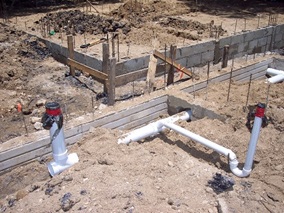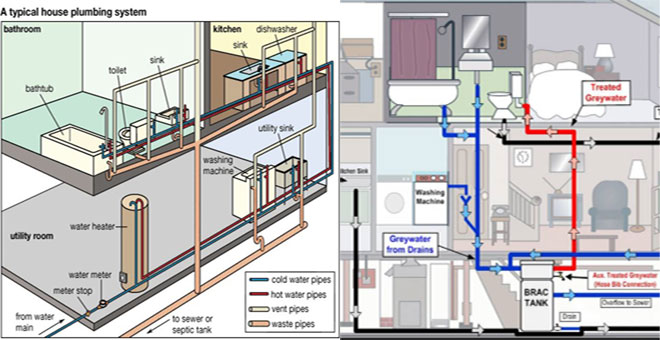The Basics to Your Home's Plumbing System Anatomy
The Basics to Your Home's Plumbing System Anatomy
Blog Article
What are your thoughts and feelings on The Inner Workings of Your Home's Plumbing?

Comprehending just how your home's plumbing system works is necessary for every property owner. From providing tidy water for drinking, food preparation, and showering to safely getting rid of wastewater, a properly maintained plumbing system is critical for your family's health and wellness and comfort. In this extensive guide, we'll check out the detailed network that comprises your home's plumbing and offer suggestions on maintenance, upgrades, and taking care of typical concerns.
Intro
Your home's plumbing system is more than just a network of pipelines; it's an intricate system that ensures you have accessibility to tidy water and efficient wastewater elimination. Knowing its parts and exactly how they work together can help you protect against pricey fixings and guarantee everything runs smoothly.
Fundamental Elements of a Pipes System
Pipelines and Tubes
At the heart of your plumbing system are the pipes and tubes that carry water throughout your home. These can be constructed from various materials such as copper, PVC, or PEX, each with its benefits in terms of longevity and cost-effectiveness.
Components: Sinks, Toilets, Showers, and so on.
Components like sinks, toilets, showers, and bath tubs are where water is utilized in your house. Comprehending just how these fixtures connect to the plumbing system assists in diagnosing problems and intending upgrades.
Valves and Shut-off Points
Valves control the flow of water in your pipes system. Shut-off valves are crucial throughout emergencies or when you need to make repair services, permitting you to separate parts of the system without interfering with water flow to the whole residence.
Water System
Main Water Line
The primary water line links your home to the community water system or a private well. It's where water enters your home and is distributed to numerous components.
Water Meter and Stress Regulatory Authority
The water meter procedures your water use, while a pressure regulator ensures that water streams at a secure pressure throughout your home's plumbing system, protecting against damages to pipes and fixtures.
Cold Water vs. Hot Water Lines
Comprehending the difference in between cold water lines, which supply water straight from the main, and hot water lines, which bring warmed water from the hot water heater, helps in troubleshooting and planning for upgrades.
Water drainage System
Drain Pipes and Traps
Drain pipelines lug wastewater away from sinks, showers, and bathrooms to the drain or septic tank. Traps prevent sewer gases from entering your home and additionally trap debris that might cause clogs.
Air flow Pipelines
Air flow pipes enable air into the drainage system, stopping suction that could reduce drain and trigger catches to vacant. Correct ventilation is crucial for preserving the honesty of your pipes system.
Importance of Appropriate Drain
Guaranteeing correct drainage stops backups and water damages. Routinely cleaning up drains pipes and keeping catches can stop costly fixings and prolong the life of your pipes system.
Water Heater
Kinds Of Water Heaters
Hot water heater can be tankless or conventional tank-style. Tankless heating systems warm water as needed, while containers keep warmed water for instant use.
Exactly How Water Heaters Link to the Pipes System
Recognizing how hot water heater link to both the cold water supply and hot water circulation lines assists in identifying problems like not enough warm water or leaks.
Maintenance Tips for Water Heaters
Regularly purging your hot water heater to get rid of sediment, examining the temperature level setups, and evaluating for leaks can expand its life expectancy and improve energy effectiveness.
Usual Pipes Issues
Leakages and Their Reasons
Leakages can occur because of maturing pipes, loosened installations, or high water stress. Dealing with leaks promptly avoids water damages and mold and mildew growth.
Clogs and Blockages
Obstructions in drains and toilets are typically brought on by flushing non-flushable things or a buildup of grease and hair. Utilizing drainpipe displays and bearing in mind what decreases your drains pipes can stop clogs.
Indicators of Pipes Problems to Look For
Low water stress, slow drains, foul odors, or abnormally high water bills are signs of prospective plumbing troubles that ought to be addressed quickly.
Pipes Maintenance Tips
Routine Inspections and Checks
Set up annual pipes inspections to capture concerns early. Search for signs of leaks, rust, or mineral accumulation in faucets and showerheads.
Do It Yourself Maintenance Tasks
Basic tasks like cleaning tap aerators, checking for toilet leakages making use of color tablets, or insulating exposed pipes in cold climates can stop major plumbing concerns.
When to Call a Specialist Plumbing
Know when a pipes concern needs professional proficiency. Trying intricate repair work without appropriate understanding can result in more damages and greater repair work prices.
Upgrading Your Pipes System
Reasons for Updating
Updating to water-efficient components or replacing old pipes can enhance water quality, decrease water bills, and boost the value of your home.
Modern Plumbing Technologies and Their Advantages
Explore innovations like clever leakage detectors, water-saving toilets, and energy-efficient water heaters that can save cash and reduce ecological influence.
Expense Factors To Consider and ROI
Determine the upfront prices versus long-term savings when taking into consideration plumbing upgrades. Numerous upgrades pay for themselves through lowered utility costs and less repair work.
Ecological Effect and Preservation
Water-Saving Fixtures and Devices
Setting up low-flow taps, showerheads, and bathrooms can significantly minimize water use without compromising efficiency.
Tips for Reducing Water Use
Simple routines like taking care of leakages without delay, taking shorter showers, and running complete lots of laundry and meals can preserve water and lower your energy costs.
Eco-Friendly Plumbing Options
Think about lasting plumbing materials like bamboo for floor covering, which is durable and environmentally friendly, or recycled glass for kitchen counters.
Emergency situation Readiness
Actions to Take Throughout a Pipes Emergency
Know where your shut-off valves are located and how to shut off the water system in case of a ruptured pipeline or significant leakage.
Value of Having Emergency Get In Touches With Handy
Keep contact information for neighborhood plumbers or emergency situation solutions easily offered for quick feedback throughout a pipes situation.
Do It Yourself Emergency Fixes (When Appropriate).
Temporary repairs like making use of duct tape to spot a dripping pipe or placing a pail under a leaking tap can reduce damage up until a specialist plumbing technician gets here.
Conclusion.
Comprehending the anatomy of your home's plumbing system encourages you to maintain it efficiently, conserving money and time on fixings. By adhering to normal upkeep routines and staying informed regarding modern-day pipes innovations, you can guarantee your plumbing system operates effectively for many years to find.
Understanding Your Home Plumbing System: A Comprehensive Guide
Plumbing System: The Lifeline of Your Home
At its core, the plumbing system is designed to perform two primary functions: bring fresh water into your home and remove wastewater. The system is a network of pipes, fixtures, and other components that transport water and sewage. Residential plumbing systems include potable water supply lines, drain-waste-vent (DWV) systems, and various plumbing fixtures that make water use in daily tasks possible.
Key Components:
Water Supply: This part of your plumbing system brings municipal water into your home, passing through the main water supply line. It s responsible for supplying all water needs, from drinking to bathing.
Drainage System: It carries waste and water away from your home to the sewer or septic system. This system includes all the piping within your home that leads to external sewage or septic systems.
Vent System: An essential yet often overlooked component, the vent system allows sewer gases to escape and lets air into the drainpipes, ensuring water and waste move correctly through the system.
Fixture: More Than Just Taps and Toilets
Plumbing fixtures are the most interactive parts of the plumbing system, including faucets, showers, toilets, and sinks. Each fixture is connected to the plumbing system and plays a role in either the delivery of freshwater or the disposal of waste and wastewater.
Types of Fixtures:
Faucets and Sinks: Used for washing hands, dishes, and other daily water needs.
Toilets: Dispose of human waste through the sewage system.
Bathtubs and Showers: Provide bathing facilities, requiring both hot and cold water supply.
Water Supply: The Source of Life
The water supply system is a critical component, ensuring that potable water is available throughout your home for various uses, including drinking, cooking, and cleaning. This system consists of pipes that distribute water to different parts of the house, controlled by valves to regulate the water flow.
Types of Plumbing: Materials and Methods
Various types of plumbing systems and materials are used in residential settings, each with its advantages and applications. From copper and PVC pipes for water supply to cast iron and ABS for drainage, the choice of materials can impact the longevity and efficiency of your plumbing system.
https://intownplumbingtx.com/articles/home-plumbing-system-guide/

Understanding Your Home Plumbing System: A Comprehensive Guide
Plumbing System: The Lifeline of Your Home
At its core, the plumbing system is designed to perform two primary functions: bring fresh water into your home and remove wastewater. The system is a network of pipes, fixtures, and other components that transport water and sewage. Residential plumbing systems include potable water supply lines, drain-waste-vent (DWV) systems, and various plumbing fixtures that make water use in daily tasks possible.
Key Components:
Water Supply: This part of your plumbing system brings municipal water into your home, passing through the main water supply line. It s responsible for supplying all water needs, from drinking to bathing.
Drainage System: It carries waste and water away from your home to the sewer or septic system. This system includes all the piping within your home that leads to external sewage or septic systems.
Vent System: An essential yet often overlooked component, the vent system allows sewer gases to escape and lets air into the drainpipes, ensuring water and waste move correctly through the system.
Fixture: More Than Just Taps and Toilets
Plumbing fixtures are the most interactive parts of the plumbing system, including faucets, showers, toilets, and sinks. Each fixture is connected to the plumbing system and plays a role in either the delivery of freshwater or the disposal of waste and wastewater.
Types of Fixtures:
Water Supply: The Source of Life
The water supply system is a critical component, ensuring that potable water is available throughout your home for various uses, including drinking, cooking, and cleaning. This system consists of pipes that distribute water to different parts of the house, controlled by valves to regulate the water flow.
Types of Plumbing: Materials and Methods
Various types of plumbing systems and materials are used in residential settings, each with its advantages and applications. From copper and PVC pipes for water supply to cast iron and ABS for drainage, the choice of materials can impact the longevity and efficiency of your plumbing system.
https://intownplumbingtx.com/articles/home-plumbing-system-guide/
I stumbled upon that blog posting on The Inner Workings of Your Home's Plumbing while doing a search on the web. Sharing is good. Helping others is fun. Many thanks for your time invested reading it.
Call Today Report this page